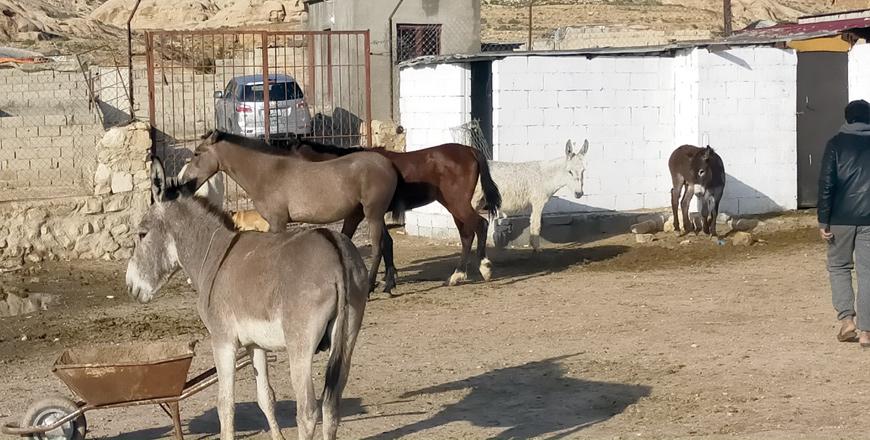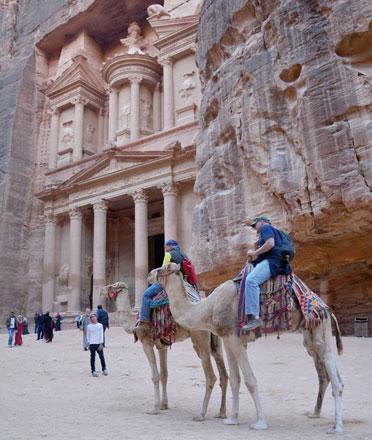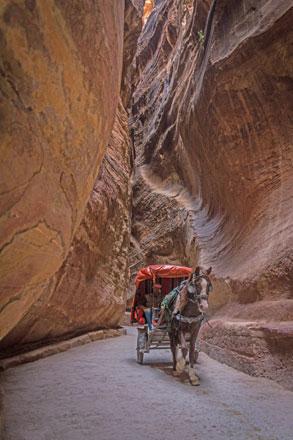You are here
PETA clinic tends to Petra’s beasts of burden
By Batool Ghaith - May 03,2021 - Last updated at May 03,2021

A view of PETA veterinary clinic in Petra, some 220 kilometres south of Amman (Photo courtesy of PETA Asia)
AMMAN — PETA veterinary clinic in Petra is the only facility in the area, which provides free emergency medical care to hundreds of injured and neglected donkeys, horses and other animals used to give tourist rides, according to a senior official at the facility.
Jason Baker, PETA senior vice president, said that PETA’s clinic treats hundreds of donkeys, horses and other animals, many of which were never examined by a veterinarian before. Cases vary from wounds and lameness to colic, dietary deficiencies, and more, he said.
“We’re helping the working animals of Petra. We also supply fodder to locals who can’t afford to feed their animals. On any given day, the clinic has an average of 50 to 70 inpatients which are animals requiring treatment and a stay at the clinic and five to 10 outpatients which are animals who need treatment but can be sent home with their owners with medicine and advice. The clinic sees and treats an average of 150 to 200 animals per month,” Baker told The Jordan Times.
Many of the over 3,000 animals treated at PETA’s free clinic in Petra, some 220 kilometres south of Amman, would have faced a lifetime of suffering and a long, painful death if they hadn’t received emergency treatment. Animals used for rides at Petra lead extremely hard lives, Baker said.
Baker indicated the clinic’s efforts to change owners’ attitudes towards their animals, many of whom have never been taught that harming animals is wrong and unacceptable.
“We are focusing on teenagers who want to impress their peers often by inflicting cruelty on the animals. We are working on improving the quality of education in the area to encourage people to treat animals with kindness. This is something that the government should focus on as well,” he continued.
Baker noted that the clinic has been operating at full capacity the whole time during the pandemic.
“There’s definitely a problem now because of the pandemic. People have little to no money left, and there has been no assistance from the government,” Baker added.
Baker pointed out that animal cruelty in the tourism industry isn’t limited to Petra or Jordan. However, at other UNESCO World Heritage sites around the world, animals aren’t forced to carry visitors up and down steep steps, he added.
At Petra, horses are forced to pull carriages on gruelling four-kilometre treks through the ancient city multiple times a day, and donkeys are forced to climb the 900 steps up to the monastery and back down again with visitors on their backs, Baker said.
Between rides, the animals are tied up in the scorching sun so tightly that they can’t even lie down, and many appear to be suffering visibly from lameness, colic, and exhaustion, he said.
“The best way to put an end to these animals’ suffering is that tourists don’t ride them,” Baker said.
According to Baker, the animal owners are, for the most part, good at following vets’ advice, sticking to the treatment their animals need, and allowing them to rest while they recover. However, some owners continue to work their animals while under treatment
“Our vets regularly follow up on the animals, and they often keep animals at the clinic for several days to make sure that they are recovering well,” Baker noted.
“At the moment, we need more staff. We’re currently hiring for two positions at the clinic, an equine veterinarian and a veterinary clinic assistant. We also rely on donations to continue our work. I can’t express enough how grateful the community is for our clinic as it is really the first time many people have had access to vet care for their animals, but at the end of the day, there needs to be a future for Petra without donkeys,” he said.
According to Baker, in Egypt, the tourism ministry has announced plans to ban camel and horse rides in Giza around the pyramids and in the archaeological areas. Instead, tourists will have access to electric cars and buses, which PETA also recommends in the case of Petra.
“We continue to hope that the Jordanian government will follow suit and eliminate animal transportation. PETA hopes that in Petra and other tourist destinations, mechanised vehicles will soon be able to replace working animals,” Baker said.
Related Articles
International and local organisations are currently working on a project to improve the health and working conditions of horses and donkeys in the ancient city of Petra, according to stakeholders.
AMMAN — People of Petra are keen to cooperate with authorities and organisations to end mistreatment of animals, a local community represent
AMMAN — The Petra Development and Tourism Region Authority (PDTRA) and KBW Investments on Thursday signed a memorandum of understanding on p


















